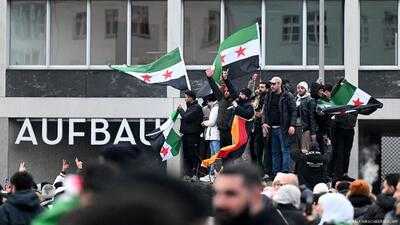

Fighting between different community groups inside Syria is also causing tensions among Syrians living in Germany. After a brawl on the streets in Dusseldorf, some fear more unrest here.Nobody ever used to ask Hassan which sect he belonged to. The 32-year-old Syrian has been in Germany since 2015, having fled after taking part in his country's civil war on the side of anti-government forces. But now they do. "The level of sectarian abuse and hate speech on social media is intense," Hassan, who lives in Berlin, told DW. Like every other ordinary Syrian interviewed for this story, he didn't want to use his full name so he could speak openly about what is a highly sensitive topic among Syrians in Germany, and back in Syria. "We're losing each other over this." By "this," Hassan means recent violence in Syria that saw two communities, the Druze and Bedouin-Sunnis, begin fighting in the southern province of Sweida in mid-July. The violence started due to tit-for-tat kidnappings between the two groups, and then escalated. It's not the only such inter-communal violence in Syria recently. In March, there was fighting between Syria's Alawite community and other Syrians, after rumors of an uprising. In both cases, there was unlawful killing by most groups involved as well as looting, kidnapping and violence. Also, in both cases, Syria's interim government was unable to maintain security. Those conflicts have now extended to the Syrian community in Germany. "People I used to be close to now seem to think we can't be friends because I'm Sunni," Hassan continued. Hassan's friend, Majid, is Druze and returned from Sweida shortly before recent violence. "I feel like people are so much more intense about this in Berlin," he noted. "I think it's because some of the people here still have an old-fashioned mindset, they still act as if the [Assad] regime is in charge." "Many of us in the Syrian community here have been feeling this shift," confirms Razan Rashidi, executive director of human rights group, The Syria Campaign, who is based in Berlin. "In the early years of the revolution, there was a strong sense of shared struggle. People rarely asked who was Sunni, Alawite, Christian, Kurdish. We were united around opposing dictatorship and calling for freedom." A Syrian brawl in Germany But thanks to recent events, that is changing. On July 20 in Dusseldorf, two groups of several hundred demonstrators met outside the city's main train station. One group was pro-Kurdish, the other supported the interim Syrian government. "After initial verbal provocations, ... a fight broke out," the Dusseldorf police reported. Two people were arrested, one injured and bottles and stones were thrown. The same weekend, at a protest in Berlin, a small group of men in the around-400 strong crowd were heard chanting against the Druze and Israel. Berlin's mayor Kai Wegner, a member of the conservative Christian Democrats, commented on the short video clip, saying that calls for murder and terror were not acceptable in Berlin. Local police are investigating and Wegner threatened to deport the Syrians who made such statements. Syria and Israel have been at war for years and recent Israeli bombing of Syria, allegedly "in defense" of Syrian Druze, has heightened tensions between the Druze minority and other Syrians. For example, Ahmad, a 30-year-old waiter in Berlin, reports he recently stopped talking to a Druze friend. "He said he wanted to buy property in Syria near the Israeli border," Ahmad explains. "You just can't trust these people," he says angrily, referring to the minority. "How could they do business with Israel?" Then he dials it back. "I don't mean all the Druze, just some," he later says apologetically. Most of the footage of the Berlin protest shows Syrians singing revolutionary songs. Arabic-language outlet Syria TV interviewed seven of the protesters. They all said very similar things about their motivations for being there. "This country belongs to all of us. We must all coexist," one said. "We need to stand together," added another. "We organized this demonstration in Berlin to reject interference in the domestic affairs of Syria and the attempts to sow ethnic and sectarian strife," another protester explained. "Yes, there have been some ugly incidents and yes, there are real fears for people who have been threatened. That shouldn't be dismissed," Rashidi says when asked whether Germany might see more violence like this. "But some of the German headlines have been unnecessarily alarmist. Most Syrians came here to escape violence, not to recreate it. The anger and heartbreak we are all feeling is very real. What we are seeing are the aftershocks of an unresolved conflict and lack of accountability back home, and sometimes even here in Europe," she explains. "But the idea that Germany is about to see the Syrian war play out on its streets is exaggerated." How to ease tensions in Syrian diaspora? At the same time, emotions are running high among the Syrian diaspora in Germany, the largest community of Syrians in Europe. Interviewees and analysts all point to social media making things much worse. There's a huge amount of disinformation and hate speech online, some of it certainly paid for or pushed by parties and governments who'd prefer to see Syria divided. One of the Syria Campaign's projects looks at that, Rashidi points out. She'd like everyone to "urge the EU Commission to implement the Digital Services Act, which is meant to ensure the platforms protect social media users from online hate." A second project calls on the UN and European leaders to do more to prevent division in Syria. Rashidi also believes there should be more support for Syrian civil society organizations that are "working around the clock to document crimes, advocate for justice, heal divisions and fight disinformation." Another Syrian initiative in Germany, the "9th of the month" movement, is also trying to counter tensions. Their name comes from the fact that political prisoners in Syria were released on December 9, 2024, and they want to protest on the ninth of every month. Members come from all around Syria and include activists who were opposed to the Syrian dictatorship even before the war started in 2011. Last weekend, they organized a silent vigil, without flags, outside Germany's Federal Foreign Office in Berlin to protest "massacres, sieges ... and sectarian hysteria." One of the co-founders of the group told DW that just like most Syrians, they reject foreign interference in Syria and also want to see the interim government do more when it comes to justice and accountability. "The movement was established to advocate for a democratic Syria rooted in human rights and the rule of law," the co-founder explained; he wanted to remain anonymous because as yet the group doesn't have a press spokesperson or an official manifesto. "We believe that the fall of the Assad regime is but a first step towards the Syria we want and that we fight for: A Syria for all Syrians." Edited by: Jess Smee
-
Madhya Pradesh July 30 2025 Weather Updates: Heavy Rain Triggers Floods In Several Districts, Guna's Kalora Dam Damaged, 30 Children Trapped In Shivpuri; Red Alert For 6 Districts

-
Mumbai Guide: Are You A Boba Tea Fan? Try Out THESE Famous Spots In City

-
Uttan-Virar Sea Link Gets Approval From Maharashtra Coastal Zone Authority; Project Affects 17.89 Hectares Of Mangroves & Forest Land

-
Aldi to bring in huge new £13 change in September - beating Tesco, Lidl, and Asda

-
Man Utd learn main obstacle to Jadon Sancho transfer exit during crucial week
